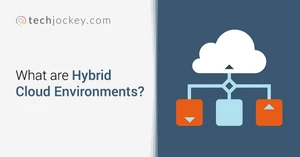What is cloud storage Definition?
Cloud storage has eliminated the need to create and manage offline storage infrastructure for an organization. You can now simply upload a file remotely on virtual servers, and access it as and when required without moving places. Users pay cloud storage service providers on a monthly or annual basis, or as per the ‘pay as you use’ model.
How Does Cloud Storage Work?
To use cloud storage, you need to log in with an account, and then you can upload any file, such as documents, images, videos, audio files, project files, etc. These files are uploaded on a chain of servers that include both a master control server and storage servers.
Because of these servers, the uploaded files can be accessed on any mobile device like a smartphone, tablet, or desktop with just an internet connection. In short, cloud storage is like a virtual drive that stores your data, which is accessible anytime and anywhere with just an internet connection.
Cloud storage also works as a collaborative tool, where you can invite your team members and co-workers to work on a document. It also enables you to assign work, give comments and suggestions. User access can be shared based on roles like some can be given access to edit a document, while others can view the shared document. However, all your documents are protected with an email id and a robust password so that you can be completely assured about the security of your documents.
Types of Cloud Storage
Catering to diverse needs, the best cloud storages are available in four different types:
-
Public Cloud Storage: In this type of cloud storage, authorized users can access a shared virtual storage space on a subscription basis. Users can access their data anytime with just a mobile device that is connected to the internet. Public cloud storage offers little opportunity for security customization, as it is being used by multiple users simultaneously. Google Cloud, IBM, Amazon Web Services (AWS) are some of the popular public cloud storage service providers.
- Private Cloud Storage: Private cloud storage is an in-house storage solution where organizations can store their confidential data on their own intranet. This type of cloud storage gives complete control over the private cloud, although this type of storage is quite expensive and demands high maintenance. It is great for organizations like banks and financial institutions that want to keep their information private.
- Hybrid Cloud Storage: Hybrid cloud storage brings all the elements of public and private cloud storage, giving you the power of choice. For instance, an organization’s highly sensitive and legally bound data can be stored on private cloud storage. However, general communication like emails can be stored on public cloud storage.
- Community Cloud Storage: Community cloud storage is quite similar to private cloud storage. However, it is confined to a limited set of employees and businesses. community instead of a single entity. Health, legal, trading, and banking sectors can use this kind of cloud storage.
Advantages of Cloud Storage
- Flexible Accessibility: On cloud storage, a user can access their uploaded documents anytime from any location. File sharing, collaborating, assigning tasks, and other modifications can be done in the documents anytime and from anywhere.
- Quick Remote Support: Cloud storage service providers extend 24*7 remote support to their customers. The remote support team ensures that users are given instant solutions to their technical problems while saving them time and cost spent on providing physical assistance.
- Long-Run Savings: Switching to cloud storage would sound a little expensive at the start, and you might have to go over budget. Although, eventually, it will prove to be cost-effective. You will end up saving the money spent on resources to manage your data and documents on-premises.
- Pay As Per Usage: For availing cloud storage services, a user needs to pay only for the amount of space they use. Although when users are charged monthly, it might seem expensive. However, it is still less than the cost incurred in an in-house storage system. However, the annual packages will help you save an extra penny.
- Globally Available: Cloud storage platforms can be completely accessed on any web browser, anywhere in the world. Global availability empowers you to work remotely even when you are on the go.
- Security: Cloud storage uses end-to-end encryption to protect your data. Good cloud storage service providers possess the capabilities to offer robust physical security, firewalls to filter traffic, run vulnerability and penetration tests, and have real-time visibility into servers.
- Facilitates Collaboration: Storing files on a cloud server enables collaboration. Being in a different country, you can work with your team members located in other countries. You can assign work, invite them to work on a document, and even work on the same document simultaneously.
- Scalable: Unlike offline storage systems, cloud storage can be expanded as and when required. You can increase your storage space by just upgrading your existing plan.
- Centralized Data Management: All the information is stored on a centralized platform, which allows you to find information easily, and you no longer need to search across physical papers or hard drives.
Disadvantages of Cloud Storage
- Dependency on the Internet: To access cloud storage you need a strong and consistent internet connection. During downtime, it is difficult to access the data stored in the cloud.
- High Costs: In public cloud storage, the cost might increase in the coming years and add up to become a huge amount. For instance, if your data is stored in the cloud but your applications are local, you’ll have to bear high networking costs.
- Prone to Attack: Anything on the internet is at the risk of malicious attacks. An organization should always look for trusted cloud service providers with security capabilities like data encryption, multi-location storage, Multi-Factor Authentication (MFA), etc.
- Vendor Terms & Conditions: An organization might face issues with the cloud service provider’s terms and conditions while switching from one cloud platform to another. Make sure to read and thoroughly understand all of them.
How Do I Access Cloud Storage
To access cloud storage, you need to follow these simple steps:
-
Create your account on a cloud service provider’s platform.
- Select a plan that suits the best for your business. You can check and compare different vendors and their cloud storage pricing in India, before making a decision.
- Now, you can upload, manage, and access your files on cloud storage with any mobile device, and an internet connection using the right credentials.
Cloud Storage vs Cloud Computing
Cloud storage and cloud computing, these two terms are often used interchangeably.
Cloud storage is an online platform that allows you to store data on remote servers. Whereas cloud computing enables you to use any software remotely, in addition to storing files. This means you don’t have to worry about heavy software taking up space on your hard drive while using the software. Cloud computing makes it possible for multiple users to use a software solution on the internet simultaneously. However, cloud storage simply means you are storing data on servers that can be accessed using the internet.
Cloud Storage vs Online Backup
Cloud storage and online data backup almost perform the same function, i.e., storing files. However, cloud storage stores all your documents like an online hard drive. Whereas the online backup creates a backup of the data that is stored on your offline system. Online backup is created with the sole purpose of saving the data from any kind of loss.
Cloud Storage Pros & Cons
| Pros | Cons |
| Store files on a centralized platform | Requires a private encryption key |
| Enables file sharing with others | Backup under standard policy controls |
| Manage files from multiple mobile devices | |
Online Backup Pros & Cons
| Pros | Cons |
| Access your data from anywhere, anytime | Mandatory internet connectivity |
| Maintain a 24x7 armed security on-site | You might face bandwidth issues |
| Easy data backup | Complete data recovery takes time |























